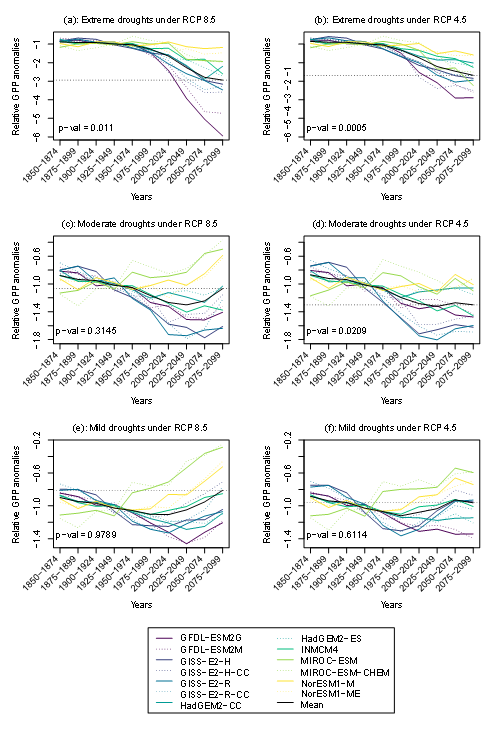The Science
This paper showed an increasingly stronger impact on terrestrial gross primary production (GPP) by extreme droughts than by mild and moderate droughts over the twenty-first century. Specifically, the percentage contribution by extreme droughts to the total GPP reduction associated with all droughts was projected to increase from ~28% during 1850–1999 to ~50% during 2075–2099.
The Impact
Even though higher CO2 concentrations in future decades can increase GPP, low soil water availability and disturbances associated with droughts could reduce the benefits of such CO2 fertilization. This study conducted the first global analysis to quantify potential impacts of drought on future GPP, which could guide future modeling and field experiments.
Summary
Terrestrial gross primary production (GPP) is the basis of vegetation growth and food production globally and plays a critical role in regulating atmospheric CO2 through its impact on ecosystem carbon balance. Here we analysed outputs of 13 Earth system models to show an increasingly stronger impact on GPP by extreme droughts than by mild and moderate droughts over the twenty-first century. The droughts were defined on the basis of root-weighted plant accessible water. Due to a dramatic increase in the frequency of extreme droughts, the magnitude of globally averaged reductions in GPP associated with extreme droughts was projected to be nearly tripled by the last quarter of this century (2075–2099) relative to that of the historical period (1850–1999) under both high and intermediate greenhouse gas (GHG) emission scenarios. By contrast, the magnitude of GPP reductions associated with mild and moderate droughts was not projected to increase substantially. These drought impacts were widely distributed with particularly high risks for the Amazon, Southern Africa, Mediterranean Basin, Australia and Southwestern United States. Our analysis indicates a high risk of extreme droughts to the global carbon cycle with atmospheric warming; however, this risk can be potentially mitigated by positive anomalies of GPP associated with favorable environmental conditions.

Contacts (BER PM): Daniel Stover, SC-23.1, Daniel.Stover@science.doe.gov (301-903-0289)
PI Contact: Chonggang Xu, Los Alamos National Laboratory, Los Alamos, NM, Email: cxu@lanl.gov; Phone: 505-665-9773
Funding
This work was funded by the Next Generation Ecosystem Experiment–Tropics project and the Survival/Mortality project sponsored by the DOE Office of Science, Office of Biological and Environmental Research, the Laboratory Directed Research and Development program of the Los Alamos National Laboratory and the University of California’s Laboratory Fees Research Program (grant no. LFR-18-542511).
Publications
Xu, C., McDowell, N.G., Fisher, R.A. , L. Wei, S. Sevanto, E. Weng, R. Middleton. Increasing impacts of extreme droughts on vegetation productivity under climate change. Nature Climate Chang. 9, 948–953 (2019) doi:10.1038/s41558-019-0630-6
Related Links
https://www.nature.com/articles/s41558-019-0630-6